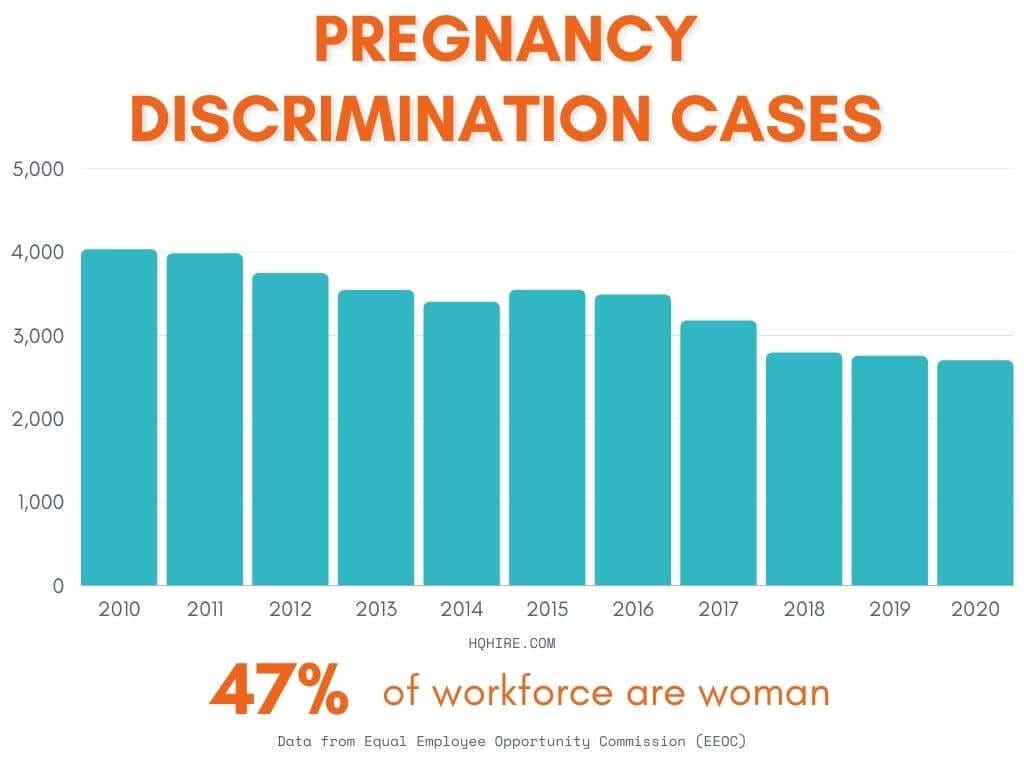Pregnancy discrimination is everywhere!
It is true! Pregnancy discrimination can be hard to prove.
With so many types of pregnancy discrimination, these tips may help you to avoid the bad experience of being discriminated against in the first place.
If you are concerned with discrimination in your workplace, there are a few things you should do to protect yourself from pregnancy discrimination at work.
Follow these steps to prove you’re facing pregnancy discrimination at work and win your case.

| Year | New Charges Filed | Favorable Outcome | % of Favorable Outcome | Monetary Benefits (Millions) |
|---|---|---|---|---|
| 2010 | 4,029 | 955 | 23.1% | $14.7 |
| 2011 | 3,983 | 1,059 | 23.1% | $13.9 |
| 2012 | 3,745 | 907 | 21.5% | $14.3 |
| 2013 | 3,541 | 848 | 23.7% | $17.0 |
| 2014 | 3,400 | 737 | 22.9% | $14.4 |
| 2015 | 3,543 | 859 | 25.0% | $14.8 |
| 2016 | 3,486 | 832 | 22.1% | $15.5 |
| 2017 | 3,174 | 815 | 21.6% | $15.0 |
| 2018 | 2,790 | 772 | 23.1% | $16.6 |
| 2019 | 2,753 | 745 | 24.9% | $22.4 |
| 2020 | 2,698 | 717 | 25.0% | $15.3 |
How To Deal with Pregnancy Discrimination at Work
Not all companies are accommodating to pregnant workers. If you are faced with such a situation, you can take a number of actions to protect yourself from pregnancy discrimination.
1. You’ll benefit from understanding your company’s policy
Find out your company’s stand on pregnancy discrimination.
- “Does your company have a policy that protects expecting mothers from pregnancy discrimination?”
- “Does your company enforce their policy to make you feel safe at work while you are pregnant?”
Above are some questions you may want to ask when you are looking at your company’s policy.
Nonetheless…
For most companies, you can probably have your inquiry answered by your Human Resource department.
You might be comforted to know that, your company is required by law to prevent pregnancy discrimination.
The Pregnancy Discrimination Act (PDA) states:
“Employer forbids discrimination based on pregnancy when it comes to any aspect of employment, including hiring, firing, pay, job assignments, promotions, layoff, training, fringe benefits, such as leave and health insurance, and any other term or condition of employment.”
You might be pleasantly surprise that your company have policy that ensure their pregnant worker are protected at work.
2. Get a work log or work dairy
Ya… I know that’s a lot of work.
But a work log is important for you to keep track of all your achievements and contribution at work if you want to be protected from pregnancy discrimination.
These are some things you may want to keep track of:
- Performance review.
- List of projects you handle.
- List of achievements you’ve completed.
- List of awards you’ve received.
- Letter of recommendation.
You may want to include the date for each of the achievements and contributions at work as well.
Why the trouble?
Work log is important because employers will often justify the reason for your treatment by citing your recent poor job performance.
With your work log, you are able to show evidence of your performance.
If required, the work log may help to increase the possibility of you winning the case that your employer is discriminating against you for being pregnant.
3. Follow your company’s practice
Every company has its own procedure to follow for communicating leave or accommodation requests.
Thus, it is important for you to follow the company’s protocol.
Here are some things to take note of:
- Make photocopies of the paperwork for each application.
- Make photocopies of your MC or doctor’s appointment slips.
- Keep email communication sent as evidence of the approval or request. You can do this by printing the email out and filing it accordingly or simply making a BCC (Blind Carbon Copy) to your personnel email as a piece of evidence.
These documents will support any future claims or complaints you may file if you suspect a violation of the Pregnancy Discrimination Act (PDA).
4. Take Care of Your Mind and Body
You are responsible for your own well-being. Avoid putting yourself under a high level of stress. You have to know your limit and be conscious about your own self-care.
Set realistic deadlines for each of your tasks.
- Break each task into smaller pieces.
- Ensure you give yourself a sufficient mental break before moving to the next task.
- Give yourself some “rest time” after each milestone is achieved.
If you always find yourself rushing to work, try leaving for work 10 to 15 minutes earlier.
This simple change can help you ease into your workday, allowing you to be both mentally and physically prepared for the day ahead.
Lastly, unplug yourself from work and all work-related communication at the end of the day.
Setting the right boundaries can help protect your personal “me” time, which is essential for you to recover from your hectic workday.
“Take good care of your mind, and your mind will take care of your body.”
5. Prioritize Your Health Over Your Job
Know that your health and well-being are always much more important than your job.
Never compromise your mental or physical health for your job even if your employer ask for it!
Always perform your own evaluation of your task and decide what is reasonable while you are pregnant.
If you find your employer is over-demanding, you may want to negotiate with your employer over the task assigned.
Most importantly, if you believe the task will impact your personal health, be prepared to put your foot down!
But in most cases, your employer won’t know the problems you are currently facing unless you tell them.
Smart employers will always take good care of their employees.
Simply because, if they take good care of their employee, their employee will take care of the company.
Thus, good communication with your employer is always important.
How To File A Complaint For Pregnancy Discrimination?
If you believe that you are being victimized at work because of your pregnancy, you may approach respective organizations for help:
- United States: Equal Employment Opportunity Commission (EEOC) for assistance.
- United Kingdom: Advisory, Conciliation, and Arbitration Service (ACAS)
- Canada: Canadian Human Rights Commission (CHRC)
- Australia: Fair Work Ombudsman
- Singapore: Association of Women for Action and Research (AWARE)
If you are from the United States, you can get help from EEOC, but there are a few things to consider:
- You need to file your complaint within 180 days of the discriminatory act.
- You need to have written notes that list down everything that happens; place, date, and time, description of the incident, and possible witness.
- Keep copies of the notes in a safe and secure location.
Alternatively, you can talk to a union representative and seek their advice.
Finally, on some rare occasions, you may want to seek professional legal help from an attorney to file a discrimination charge.
Up Next… Surprising Facts to know about Pregnancy Discrimination at Work
“Is there Pregnancy Discrimination?”
Check out this video below!
Like this post?
Let us know in the comments below!
Wait a minute…
Do you have a story to share?
Do you want to join the conversation with us? Check out our career forum.
- 7 Examples of Pregnancy Discrimination in The Workplace (Need to Know)
- How to Deal with Pregnancy Discrimination at Work (Proven)
- 7 Things to Know about Pregnancy Discrimination at Work
- Can You Get FIRED From Your Job While Pregnant? (Answered)
- How to Resign During Bond Period Without Paying Bond? (Solved)
Join over 11,000+ achievers who are committed to achieving their career goals!







